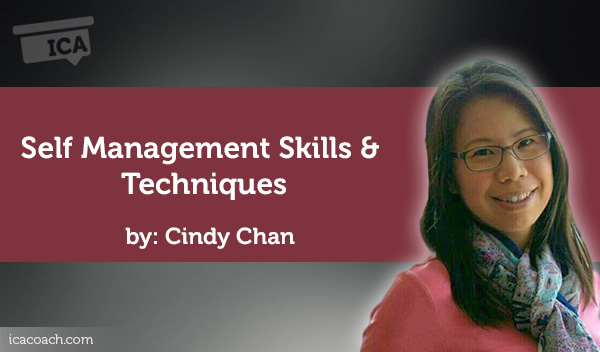Coaching Case Study By Cindy Chan
(Leadership & Capabilities Development Coach, SINGAPORE)
Background & Challenge
Jorden has been in the ambit of youth work for 18 years, working with youths at risk, youth volunteerism and youth work advocacy with various Voluntary Welfare Organisations (VWO) and Government bodies. His specialisation is in Operations and Implementation.He felt it was time to change his career pathway to lead a more fulfilling second career in the ambit of the aging population. Push factors included a need to reduce excessive weekend and weeknight work.
His 3-month old job led him to question his calling and capability of being able to do the work required of him and sent him into a vicious cycle of self-doubt, crashing self-confidence and negative emotional roller coasters.
A few main themes surfaced from our first session:
- Being angry that his work and efforts were never duly recognised by his supervisors.
- Being hoodwinked into his new job.
- Being frustrated with how his career is going in terms of salary progression and opportunities.
By the 6thcoaching session, Jorden realised his career choices were limited to tried and tested successes, that being a perfectionist and self-credibility were his biggest internal barriers that stopped him from expanding his choice of career pathways. He recognised his passion being rooted youth work with strengths in imparting knowledge and skills as a lecturer, rather than executing policies and running youth related events for the second half of his career.
Coaching Skills Employed
- Creating and holding a safe space
- Being fully present
- Listening to what is heard and not heard
- Asking powerful questions
- Paraphrasing for clarification
- Role Playing for interviews
Coaching Process and Models Used
Using the Wheel of Career Motivation in our next 2 sessions, Jorden identified barriers and saw opportunities to pull that will motivate him to succeed and do well. Areas Jorden identified were:
- Salary
- Forms of Recognition
- Promotion
- Family Time
- Health
- Working Sector
- Organisation Culture
- Bosses and Colleagues
Jorden was satisfied with his current salary, working sector and timely promotions.He was unhappy with his bosses, quality of health and family time due to the demands of work. Realisations in subconsciously chasing recognition and promotions due to unfair practices in the earlier stages of his work life made this a non-negotiable factor when choosing jobs. The need to be seen as credible and excelling at all he does drove him to stages of burnout and health deterioration.
He iscommitted to remain in youth related work and will continue to pursue his second career in this ambit. Improving the quality on health, family time and organisation culture are key considerations in choosing his next job.
We used of MBTI to heightenself-awareness of his preferences and styles of communication, stress triggers and to be more self-observant when he is under stress.
In subsequent sessions, we used the GROW model to frame the dialogues. This helped him to see more opportunities and broaden his views of a career.
Goal
Jorden’s goal was to serve meaningfully in the youth ambit and expand his portfolio and skill set to go beyond that of Operations. His next career move will need to work around upskilling his professional domain and meeting family needs – to support his wife’s career and spend quality time with his daughters.
Reality
His clarity of his current job is not fitting with his goals made him decide to resign without a job offer. He described his decision being “…in peace…” with this step. His feared the reality of being unemployed as this has never happened before. We surfaced reasons that could be causing such sentiments and how he could empower himself to see this “sabbatical period” as beneficial.
Options
Jorden started looking at job offers in Operations & Youth work as this was his area of specialisation and was willing to take >50% pay cut to stay in this sector. Using a series of questions to reflect on his scores around salaries & recognition basis his past experiences and future expectations, he was able to comfortably set a range he will accept without ill-feelings. This broadened his job search into areas of lecturing, consulting and counselling which will leverage on his deep experiences and insights of the industry and landscape of youth work.
Will
In the 5th session, we role played his presentations and sharpened his articulation as a lecturer / counselor. He has since successfully attended 3 job interviews in consulting and lecturing, and has successfully progressed to the final rounds of interviews with an established tertiary body. In our final session, he had a rough plan detailing next developmental steps to up skill himself, assessed his financial status and will work out the detailed with his wife by the end of the month. He is more confident of himself and in his word “… has re-established a connection to his purpose / calling.”
My personal reflections and learnings:
- Regardless of my own experiences and insights of coaching and mentoring others, I will never be in the position to tell / advice my Client on what is best for them because they lived their entire life and I only lived vicariously through them in a few conversational hours. Holding back my advice and suggestions will be more helpful than giving them.
- Listening and being fully present is not easy. My learning can be summarised into 2 statements – “Be Curious.” “I don’t know anything.”
- Managing my emotions and being self-observant of my own preferences (MBTI Type) and triggers that may lead me to judge are key to being a valuable coach who can hold and keep the space safe for my Client at all times.
